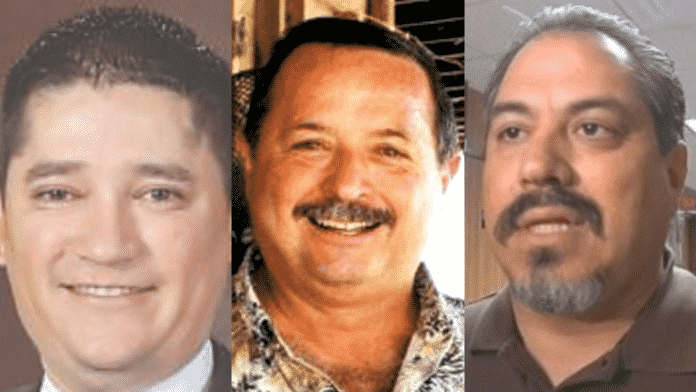Three men accused of conspiring together to defraud the city of Weslaco of millions of dollars will finally have their day in court after a federal judge assigned a trial date in the case.
Jury selection in the trial against former Hidalgo County Commissioner Arturo “A.C.” Cuellar, Weslaco businessman Ricardo “Rick” Quintanilla, and Daniel J. Garcia, an attorney from Rio Grande City, will commence April 26, U.S. District Judge Micaela Alvarez announced during a status conference Thursday.
Opening arguments could also begin as soon as that day, she said.
Federal prosecutors say the three men conspired with several others in a pay-for-play scheme involving the $38.5 million rehabilitation of Weslaco’s water treatment plant.
The scheme allegedly involved funneling millions of dollars from a trio of engineering and construction firms to Weslaco public officials in order to secure their favorable votes in awarding the project contracts.
The criminal case against the men first came to light when Leonel Lopez Jr. — then the Rio Grande City municipal judge — pleaded guilty to federal programs bribery in March 2019. Just days later, Gerardo “Jerry” Tafolla, then a city commissioner for Weslaco’s District 4, pleaded guilty to the same charge.
By April 2019, prosecutors had unsealed a 74-count superseding indictment against Cuellar, Quintanilla, Garcia and another man: former Weslaco District 2 commissioner John Cuellar. The two Cuellars are cousins.
All four men initially pleaded not guilty to the charges, though John Cuellar later changed his plea to guilty in August 2019.
The remaining three men have maintained their innocence, but the case against them has been unable to go to trial due to numerous delays.
First, in May 2019, Alvarez granted a request from prosecutors to declare the case “complex” — extending the Speedy Trial clock by a year.
The COVID-19 pandemic pushed a July 2020 trial date to November, delaying things again when the virus continued to rage last fall.
The government suffered a blow to its case, however, when Lopez, who was expected to be a key witness, died of cancer in mid-November, just days after prosecutors tried — and failed — to gain the court’s permission to preserve his testimony before his death.
It was at that November hearing that Alvarez set Jan. 21 as the date she would revisit the trial timeline. And though the pandemic continues unabated, on Thursday, Alvarez chose to set the trial for this spring.
But the pandemic, as well as some unusual time constraints, will affect how that trial will proceed.
Alvarez herself will conduct voir dire, the jury selection process.
“I will do the voir dire. I will give counsel, of course, the opportunity to address issues with the court that the counsel thinks need to be addressed with the (jury) panel,” Alvarez said.
The judge asked the attorneys to prepare their questions for the jury panel by April 9, when the court will hold a pretrial conference.
Alvarez stressed the importance for both sides to finalize their preparations — of evidence exhibits, witness lists and opening arguments — as swiftly as possible in order to conclude the trial before mid-May, when she will be unavailable for court.
“We will proceed immediately to trial, so if we get done with jury selection that day — and hopefully we can do that — you should be ready to present opening arguments,” Alvarez said of beginning trial on April 26.
The trial is expected to take two weeks, with prosecutors saying they would need four to five days to present their case, while the three defense teams estimated they would need at least a week, combined, to present theirs.
“You’ve all practiced before me, and if we are in trial, we are in trial and the court goes a full day — and late, if necessary,” Alvarez replied.





